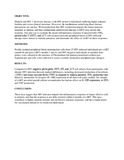| dc.description.abstract | OBJECTIVE:
Malaria and HIV-1 adversely interact, with HIV-positive individuals suffering higher parasite burdens and worse clinical outcomes. However, the mechanisms underlying these disease interactions are unclear. We hypothesized that HIV coinfection impairs the innate immune response to malaria, and that combination antiretroviral therapy (cART) may restore this response. Our aim was to examine the innate inflammatory response of natural killer (NK), natural killer T (NKT), and γδ T-cells isolated from the peripheral blood of HIV-infected therapy-naive donors to malaria parasites, and determine the effect of cART on these responses.
METHODS:
Freshly isolated peripheral blood mononuclear cells from 25 HIV-infected individuals pre-cART (month 0) and post-cART (months 3 and 6), and HIV-negative individuals at matched time-points, were cultured in the presence of Plasmodium falciparum parasitized erythrocytes. Supernatants and cells were collected to assess cytokine production and phenotypic changes.
RESULTS:
Compared to HIV-negative participants, NKT, NK, and γδ T-cell subsets from participants with chronic HIV infection showed marked differences, including decreased production of interferon γ (IFNγ) and tumor necrosis factor (TNF) in response to malaria parasites. IFNγ production was linked to interleukin-18 receptor (IL-18R) expression in all three cell types studied. Six months of cART provided partial cellular reconstitution but had no effect on IL-18R expression, or IFNγ and TNF production.
CONCLUSION:
These data suggest that HIV infection impairs the inflammatory response of innate effector cells to malaria, and that the response is not fully restored within 6 months of cART. This may contribute to higher parasite burdens and ineffective immune responses, and have implications for vaccination initiatives in coinfected individuals | en |

